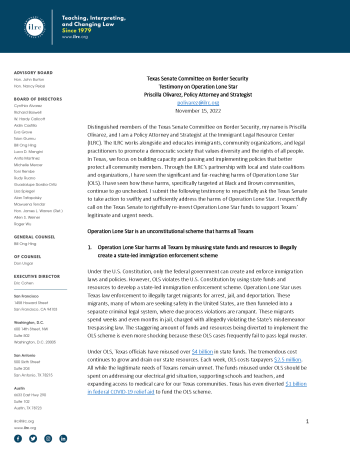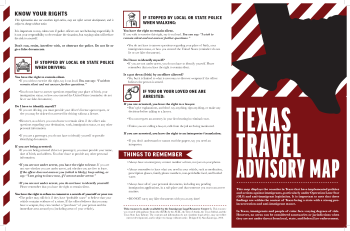
This map displays the counties in Texas that have implemented policies and actions against immigrants, particularly under Operation Lone Star
(OLS) and anti-immigrant legislation. It is important to note that these findings are within the context of Texas being a state with a strong pro-incarceration and anti-immigrant stance.
Este mapa muestra los condados en Texas que han implementado políticas y acciones contra inmigrantes, en particular bajo el Operativo Lone Star (OLS). Es importante tomar en cuenta que lo que muestra el mapa es bajo el contexto de que Texas es un estado con opiniones fuertes a favor del encarcelamiento y sentimientos anti-inmigrantes.
En Texas, inmigrantes, migrantes y personas de color enfrentan riesgos de diferentes niveles. Sin embargo, ningunas áreas pueden ser consideradas santuarios o jurisdicción donde no estén bajo amenaza de los departamentos de policía local, estatal, y federal.
Para obtener más recursos sobre el Operativo Lone Star, visite https://www.endlonestar.com/
(OLS) and anti-immigrant legislation. It is important to note that these findings are within the context of Texas being a state with a strong pro-incarceration and anti-immigrant stance.
Este mapa muestra los condados en Texas que han implementado políticas y acciones contra inmigrantes, en particular bajo el Operativo Lone Star (OLS). Es importante tomar en cuenta que lo que muestra el mapa es bajo el contexto de que Texas es un estado con opiniones fuertes a favor del encarcelamiento y sentimientos anti-inmigrantes.
En Texas, inmigrantes, migrantes y personas de color enfrentan riesgos de diferentes niveles. Sin embargo, ningunas áreas pueden ser consideradas santuarios o jurisdicción donde no estén bajo amenaza de los departamentos de policía local, estatal, y federal.
Para obtener más recursos sobre el Operativo Lone Star, visite https://www.endlonestar.com/
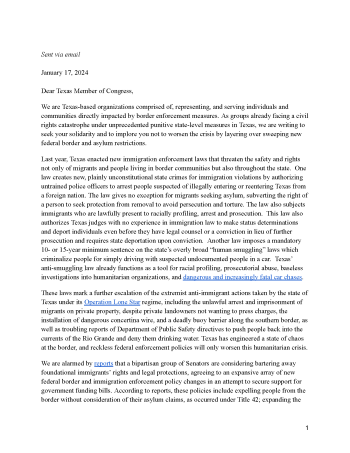
Texas-based organizations comprised of, representing, and serving individuals and communities directly impacted by border enforcement measures write to Texas Members of Congress to seek solidarity and to implore not to worsen the crisis by layering over sweeping new federal border and asylum restrictions. The organizational letter highlights how these changes would have disastrous consequences not only for migrants but for Texas communities, who are presently living under the oppressive and unconstitutional Operation Lone Star.

This slide deck was created by a coalition of organizers, activists, and attorneys in Texas to be publicly available for use as a resource when conducting know-your-rights presentations on Texas SB 4/ HB 4.
Community leaders, organizers, and activists are welcome to use this full slide deck as provided, or select the slides that are applicable to your presentation needs.
Community leaders, organizers, and activists are welcome to use this full slide deck as provided, or select the slides that are applicable to your presentation needs.
An immigrant legal defense fund pays legal service providers to represent community members facing deportation in immigration court. This resource provides a general overview of immigrant legal defense funds (ILDFs) at the municipal level in Texas, including why they are needed, the goals and components of a strong ILDF, and examples of these funds from across the state.
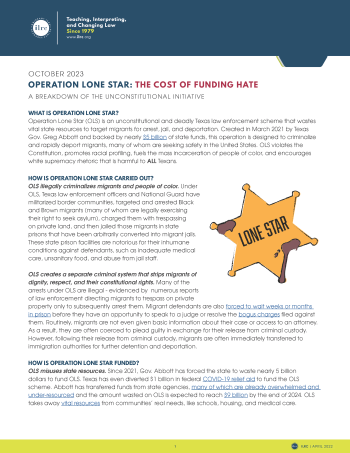
In Texas, Black and Latinx migrants are being harmed by Operation Lone Star- an unconstitutional and racist law enforcement operation that is criminalizing migrants who are seeking safety in the U.S. border. Operation Lone Star is a complex scheme involving multiple law enforcement agencies in the state. This comprehensive resource explains how Operation Lonestar is being implemented and funded, explains why this operation is illegal and unconstitutional, highlights how this scheme expands the carceral and enforcement systems, and how it’s harming entire border communities.
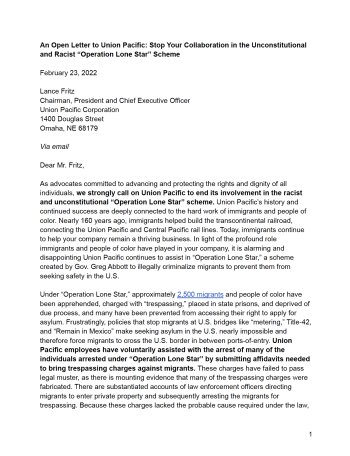
Our ILRC Texas team continues to lead the charge opposing Governor Gregg Abbott's Operation Lone Star. This sign-on letter urges Union Pacific to end its involvement in the racist and unconstitutional “Operation Lone Star” scheme.

Black people and other communities of color, including immigrants, have faced decades of overpolicing, criminalization, and incarceration in Texas, often for alleged conduct that does not mandate an arrest or even carry jail time in the state. One way to effectively reduce arrests is to pass a local cite and release policy. This advocacy toolkit gives local organizers and advocates in Texas the tools they need to lead a successful cite and release campaign. We have included many helpful resources, samples, and insights for every step in a cite & release campaign – from initial education, research, and data collection through policy implementation.
The ILRC’s work in Texas focuses on building capacity and passing and implementing local policies that dismantle the arrest-to-deportation pipeline and decriminalize immigrants, Black people, and other communities of color. To further this goal, the ILRC’s Texas team employs an array of strategies to advocate for local policies and cultivate partnerships that promote immigrant rights and criminal justice, undercut the impact of one of our nation’s most regressive anti-immigrant laws, SB 4, and build power for long-term wins. This overview of our work in Texas discusses our vision and strategy, and highlights some of our recent successes.
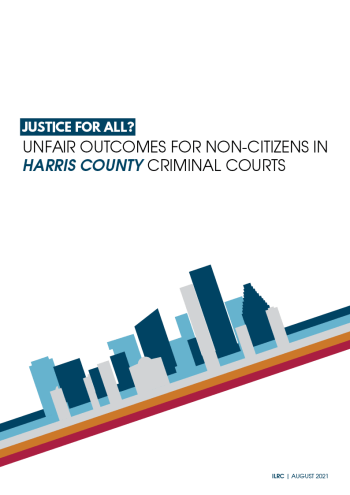
Harris County, home to approximately 1.2 million immigrants, is one of the largest and most diverse counties in the United States. Unfortunately, it also operates an expansive jail system and is an epicenter of immigration enforcement. This report looks at criminal case outcomes before Harris County courts and highlights disparities between U.S. citizens and non-citizens in arrests, charges, bail, case disposition, and sentencing. Through this report, we seek to raise awareness about how non-citizens are unjustly treated in Harris County, and we provide key policy recommendations for stakeholders to take immediate action to address such inequities.
